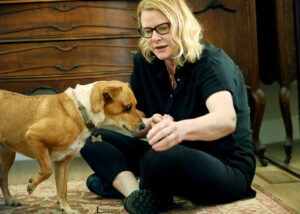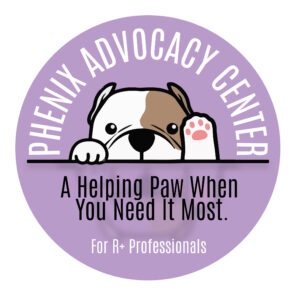Barks Blog
How Writing a Book on Canine Behavior Changed My Life
by Annie Phenix
When my publisher’s acquisition editor called me out of the blue in July 2021 to ask if I would write a second edition to my first canine behavior book, The Midnight Dog Walkers, my immediate response was a firm “no.”
I had many reasons to decline. I had removed myself from the arena, so to speak, and wasn’t active in training groups or going to conferences. I considered myself semi-retired, and while I still consulted with dog owners, my focus was not on the dog training industry itself.
Oh, the life I enjoyed for those five years! I read (if you can imagine) books that had nothing to do with dogs or dog training. I traveled. I hiked. I cooked healthy, fresh meals for my husband and me, and we even had date nights. I began to have hobbies! I was calm. Healthy. Happy. I lived! My own dogs got all of me.
Then COVID changed our world and rearranged everything. We all lived—and still do live—in an endless loop of worry and despair. We all lost so much, including people we love. We lost faith in others caring about our health and well-being. It felt, and still feels, that everyone is in it for themselves and their immediate circle.
And then my editor called.
It was a simple question: “Will you write a second edition for your book?”
“It won’t take long at all,” she assured me. “You only have to write 20% new information, as the rest will be from the first book.”
I asked more questions because, as a journalist, I am good at asking questions.
“Will the title of the new book be the same?” No.
“Will the subject matter be the same?” No. Too much memoir stuff in the first one. We want less of that.
But I knew that sharing my story and my life with dogs is what resonated the most with so many readers. I knew because readers told me this.
So, I said “no” again. (For such a small word with two letters, it is one of the strongest words in the English language.)
And then I thought about it some more. I discussed it with my husband. He said he liked all the time we were spending together now that I was mostly retired. He liked seeing me happy, relaxed and enjoying a slower pace. And then there were the hobbies, such as painting old furniture and bringing it back to life. There are no emotions to navigate in painting furniture: you just paint, and voila. He also said I should decide with my heart and he would support whatever I wanted to do.
I phoned a friend in Ireland. A fellow dog trainer. She knows what this industry is like and the toll it takes on us—body and soul. She said I needed to write it. For the owners. For the dogs themselves.
“But it will be a lot of work,” I responded. “It will be hard!”
“We can do hard things,” she said. “We’ve been doing them all of our lives.”
I signed the publisher’s contract. I got to work on the book, but I did so in curmudgeon mode, believing this was my last contribution to the world of dog training and I just wanted to be done already.
I started researching and writing with a lot of resentment in my heart, as this work was interrupting my life plan. I also knew I wasn’t simply going to update the first book. I had no interest in doing that—too much had changed in the industry since I had removed myself from it. I did what I always do and began with “what?” and “who?” and “why?”
What had changed in terms of the way training professionals are helping troubled dogs since I wrote The Midnight Dog Walkers?
Who are the trainers leading the industry and changing it for the better—making us more effective and fairer to dogs under our care?
Why are these trainers doing things differently than so long ago when we were all commonly using counter conditioning and desensitizing as a tool to help troubled dogs?
I also knew what I would not be writing about: CC&DS, ABA, LIMA, Pavlov, Skinner, the four quadrants (something I wish to never write about again in my lifetime). There have been millions of words written about these things, including in my first book. I wanted updated, modern, science-based programs to be in my new book.
I stumbled upon UK Behaviorist Andrew Hale’s YouTube series, Beyond the Operant. I literally stopped writing for an entire month, even though I had a mere six months in which to create a large book. I dove deep into research, and each new process I discovered slowly started to remove the dissatisfied hate kernels I had buried deep in my heart for the dog training industry. I learned about Kim Brophey’s work with her L.E.G.S. program. I took her course, and I am now a Family Dog Mediator. I learned about Dr. Laura Donaldson’s vital work with cognitive reappraisal and her Slow Thinking Is Lifesaving for Dogs™ course. I learned of Sarah Fisher’s Animal Centred Education (ACE) and Free Work on Tilly Farm in England.
I kept on learning, and then I became gobsmacked. I felt those little hate kernels in my heart start to slowly dissolve. I let myself—for the first time in my career—feel a sense of optimism for the fate of dogs and for the fate of my R+ community. I began to interview brilliant professionals who are not the ones throwing online insults at other R+ trainers. They have their heads down, and they are doing their important—and groundbreaking—work helping dogs and their owners.
I reached out to 17 world-class canine experts and asked to interview them for the new book. Every one of them immediately said “yes.” Every one took a considerable amount of time to answer my questions. No one asked for payment. I had the pleasure of talking with these experts for more than a year as I worked on the book.
And then something else began to happen to me. Just like the Grinch, these kind and compassionate professionals began a healing process for me that I didn’t know I needed. Their collective knowledge, strength, heart and compassion worked little by little to remove my heart hate spots that had been there quite deeply for decades. As my grinch heart healed, I began to feel this in my bones: we are not as isolated as we are led to believe. If a trainer is only watching the toxic stew of our industry online, she would find scant evidence of peer support on most days. She would see and feel online knives in the backs of those she thought were all on the same team. She would see a lot of ego and not a lot of compassion for one another.
I found that compassion in my colleagues as I was interviewing them for the book and getting to know them and their work. Without consciously being aware of it, I had chosen professionals who are all kind people, loving people. And that love and compassion reached me and my grinch heart.
My Irish colleague, Behaviorist Denise O’Moore, and I began interviewing our colleagues on Facebook Lives, and we discovered even more what we all seem to need so desperately: connection. We are hard-wired for connection, and COVID and the insanity of our times has made that need even more heightened. Many of our colleagues wanted to stay on the Zoom calls after the interviews and just talk about life. We never once talked about the four quadrants.
The more I am able to connect with my colleagues, the more my heart heals and the more I care about our R+ industry as a whole. During the past few years talking to colleagues, I began to see how many of us crave and need this real connection, and that we need a space to talk about our lives. We have difficult jobs.
Since I finished writing the book, I decided to take a leap and create a safe, special place just for R+ canine professionals. A hearty group of 21 volunteer dog trainers and I have been working to create a Facebook community for our new endeavor: The Phenix Advocacy Center for R+ Canine Professionals. We will be providing peer-to-peer support in our private Facebook group for R+ canine professionals. We are based on the incredible group of veterinarians who provide peer-to-peer support for their own: the Not One More Vet organization.
Oh, and the book? It is completed and should be published in the summer of 2023. I hope it does what I want it to do and serve as a starting place for helping dog owners who have troubled dogs. I also hope, through the words of the experts who I was honored to interview, it can break down the self-protection we have had to develop as R+ trainers. The book is titled, Positive Training for Aggressive and Reactive Dogs: Proven Techniques to Help Your Dog Overcome Fear and Anxiety. I’ve watched it land on various Amazon bestseller lists for a year now, and that has only swept away what grinchiness was left in my heart.
Resources:
ACE Connections. (Sarah Fisher). Facebook (private group). https://www.facebook.com/groups/332134427492077
Animal Centred Education. (Sarah Fisher). https://animalcentrededucation.teachable.com
Dog Centred Care. (Andrew Hale). Beyond the Operant (series). YouTube. https://www.youtube.com/playlist?list=PLkbPkJzbljZUxwUoykDTJA2aeWl1q3Hwj
L.E.G.S.® Applied Ethology course. (Kim Brophey). Family Dog Mediation®. https://kimbropheylegscourses.thinkific.com/courses/legs-applied-ethology-family-dog-mediation-professional-course
Not One More Vet. www.nomv.org
Phenix, A. (2023). Positive Training for Aggressive and Reactive Dogs: Proven Techniques to Help Your Dog Overcome Fear and Anxiety. CompanionHouse Books.
Slow Thinking Is Lifesaving for Dogs™. (Dr. Laura Donaldson). Four Paws, Four Directions Dog Training and Behavior Consulting. https://fourpawsfourdirections.com/slow-thinking
The Phenix Advocacy Center for R+ Canine Professionals. https://phenixadvocacycenter.com
The Phenix Advocacy Center for R+ Canine Professionals. Facebook (public page). www.facebook.com/profile.php?id=100089557613242
The Phenix Advocacy Center for R+ Canine Professionals: MEMBERS. Facebook (private group). https://www.facebook.com/groups/1425276967879834
The Phenix Advocacy Center for R+ Canine Professionals: VOLUNTEERS. Facebook (private group). https://www.facebook.com/groups/748491550204859

Annie Phenix has worked with troubled dogs for more than 25 years. She has learned the most from the dogs themselves, including the 400 dogs she has fostered. She is a bestselling author and journalist. She is also a member of the Pet Professional Guild and is a Fear Free Certified Professional, a Family Dog Mediator and a Certified Behaviorist through INTODogs. She lives in Utah with her magnificent husband, Jeff, and their two hooligan cattle-collie dogs, Finn and Cooper.


